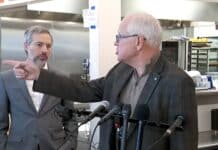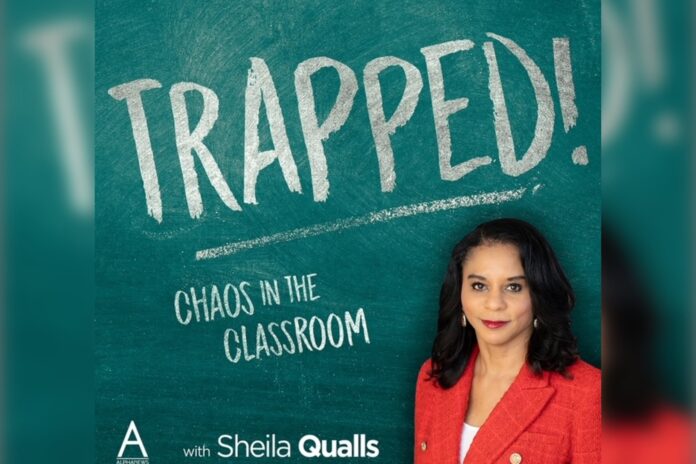An administrator in an Anoka-Hennepin public high school told teachers not to notify parents if a kid wants to socially transition at school, even though district policy says the opposite, according to a former district employee.
According to the Anoka-Hennepin School District Equal Educational Opportunity Policy, “students have a right to be addressed by a name and pronoun that corresponds to their gender identity. After conferring with parents and the student, school employees should use the pronoun and name with which the student identifies.”
Any employee who “violates district policy would be subject to consequences,” which range from training to termination, said Jim Skelly in an email to Alpha News. He is director of communications and public relations for the Anoka-Hennepin School District.
Socially transitioning means a kid can change their name and pronouns and use bathrooms consistent with the gender they identify with regardless of biological sex. Some kids even change clothes once they get to school.
Jenny is a former employee of the district. She asked to be identified by a pseudonym for fear of retaliation.
“During the meeting, she clearly presented the information of the policy in written form, but said, ‘You don’t have to check with the parents. That’s not your responsibility to go and have a discussion with the parents, even if the student wants to change their name, or pronouns, one day, and then three weeks later, they want to have different pronouns. You just do whatever the student wants,'” Jenny said.
She said teachers and administrators will allow kids to socially transition at school while hiding it from parents.
Kids aren’t getting an education to prepare them to become successful functioning adults. They’re questioning their gender and talking about ideas that may be beyond their maturity level.
Most parents don’t know.
Radical ideologies are camouflaged with harmless words such as culturally responsive teaching, social emotional learning, equity, and belonging.
“We know these things are happening and teachers know it’s true,” Jenny said. “The only reason people are pushing back or trying to contest this is that they want to keep the secret. They want to confuse the community and say that these things aren’t really happening. I have no reason to lie about this.”
If administrators won’t give a kid an aspirin without parental consent, why are they allowing them to change their pronouns and names without telling parents?
Teachers and administrators at Woodbury High School allowed “Dave’s” kid to change his name and pronouns without notifying Dave, he told Alpha News. Dave also asked to be identified by a pseudonym for fear of retaliation.
Administrators eventually contacted him to ask if it was okay to change his kid’s name and pronouns.
“We said ‘no’ and gave them details about things we’re trying to work through at home as a family,” he said.
Even when parents say “no,” some schools do it anyway.
“They basically came back with, ‘Tough luck, too bad. We’re fostering gender diversity, so your child is able to change their name, regardless of what you say,'” Dave said.
Administrators who should be working with parents sometimes work against them.
He said his kid’s new name started showing up on Schoology and in school records.
South Washington County Schools previously told Alpha News that it always does its “best to work and engage with our parents and families.” They referred Alpha News to district policies, including a name and gender request form, which states that it is “best practice,” but not required, to “consult with the student’s parents before modifying/amending existing records.”
The policies vary from district to district. Some districts require parental consent. Others don’t. St. Paul Public Schools has a policy that says educators must address kids by their preferred name and pronoun, “regardless of parental consent.”
Nationally, more than 1,000 districts serving more than 10 million students have policies in place that “openly state that district personnel can or should keep a student’s transgender status hidden from parents,” according to a tracker from Parents Defending Education. In addition to St. Paul, Richfield Public Schools and Rosemount-Apple Valley-Eagan (District 196) are on the list.
Social contagion
Experts say cases of gender dysphoria were rare before 2012.
According to Brian Nystrom, a licensed independent clinical social worker, as recent as 2013, only 0.1 percent of kids suffered from gender dysphoria. Today studies indicate that number has risen to anywhere from 2 to 5 percent.
“You’ve got some schools where up to 20 percent of the girls are saying they’re transgender,” he said.
“In the mental health field, we have gender-affirming care,” he explained. “Gender-affirming care is the idea that any child who shows distress related to their sex should automatically be treated with social transition to the sex of their choice, followed by hormonal interventions, and then possibly surgery to remove body parts.”
According to Nystrom, the American Pediatric Association and the American Psychological Association have endorsed gender-affirming care.
“If a kiddo comes in to their office who was born a boy, but now they want to become a girl, that pediatrician is supposed to say, ‘Oh, that, that’s wonderful, I accept you where you’re at, I won’t even question anything,'” Nystrom said.
He said gender dysphoria can be a social contagion among students.
“Student transition secrecy and nondisclosure to parents by school districts is, in our view, a violation of parental consent rules applicable to all medical and social behavioral issues on the part of the schools,” said Doug Seaton, founder and president of the Upper Midwest Law Center.
Nystrom said teachers aren’t qualified to help kids socially transition.
“I know a lot of teachers. Many of them do a fantastic job, but this is not their purview,” he said.
Nystrom said most kids don’t think about sex until they hit puberty, so if a kid is socially transitioning at a young age, it’s probably not their idea.
“They’re getting the message somewhere else. This is not coming from the child. This is coming from the environment, maybe other kids who are encouraging. It could even be teachers encouraging it, by how they lead a discussion in the classroom,” he said.
Nystrom said kids shouldn’t be encouraged to keep secrets from parents.
“If they’re keeping a secret from the parents, and that’s endorsed by the teachers, this creates a very difficult family situation. Parents don’t know what the truth is and the child is learning how to be deceptive to their parents. This builds and builds in a family system, where it pits the child against the parents and the parents against the child. It has disastrous consequences not only for the kid, but for the whole family,” Nystrom said.
When districts keep secrets from parents, it can be hard on some teachers.
“It puts us in a bad place where I want to let the parents know, like, ‘Hey, are you okay with this? Because if you’re not, we should find a solution.’ We’re putting the needs of these students that are transitioning first above anybody,” said John, who teaches in District 196 and asked to be identified by a pseudonym for fear of retaliation.
Alpha News reached out to District 196 but did not receive a response.
This is an abridged transcript, with some additions, of “Trapped! Chaos in the Classroom,” S2: E3.
LISTEN:
Sheila Qualls
Sheila Qualls is an award-winning journalist and former civilian editor of an Army newspaper. Prior to joining Alpha News, she was a Christian Marriage and Family columnist at Patheos.com and a personal coach. Her work has been published in The Upper Room, the MOPS blog, Grown and Flown, and The Christian Post. She speaks nationally on issues involving faith and family.











